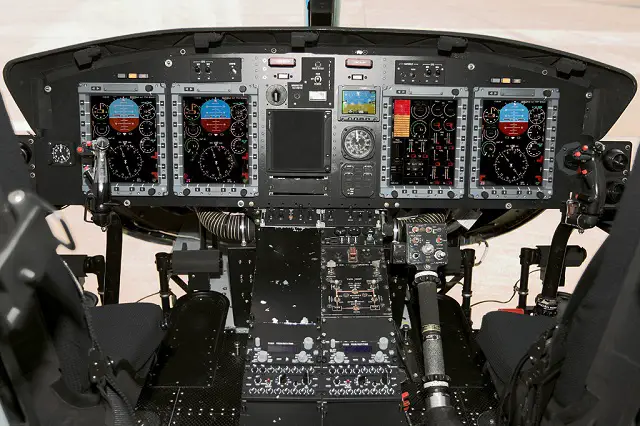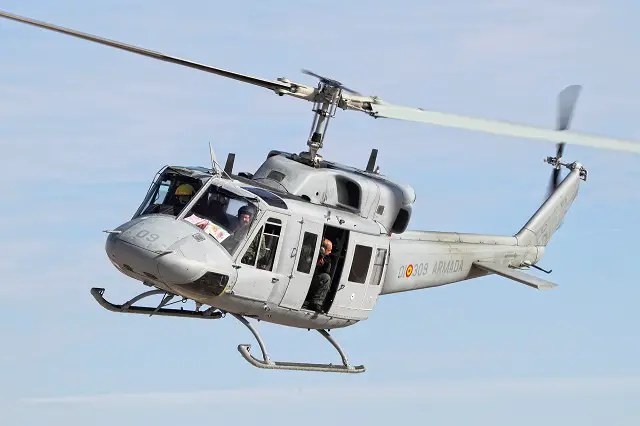|
|
| a |
Naval
Forces News - Spain |
| |
|
| |
| |
Upgraded
AB212 Helicopter of the Spanish Navy’s 3rd Squadron takes flight |
| |
On
December 17, the helicopter used as prototype in the AB212 Helicopter
Life Extension Program of the Spanish Navy (PEVH-AB212) took to the
air for its first test flight. This flight is the first in a series
of tests approved by the INTA (National Institute for Aerospace Technology),
which were authorized through special experimental airworthiness certification
(CAE in its Spanish acronym).
This milestone caps off more than three years of concept development,
led by the Spanish Navy, with the resulting project being awarded at
the end of 2011 to the SENER-INAER AB212 joint venture, formed by the
engineering and technology group SENER, which is in charge of the design
and integration process, and INAER Helicópteros SAU, which leads
installation and certification at its prototype integration center located
in Alicante, Spain. The close collaboration between the Spanish Navy
and the joint venture, as well as the participation of INTA from the
beginning of the program, was decisive in successfully meeting the demanding
security requirements before the experimental airworthiness certification
could be issued. Three other aircraft will be added to this prototype
during 2014 along with three more in 2015, making up the seven helicopters
currently used by the Spanish Navy’s Third Aircraft Squadron.
|
|
 The new
cabin system incorporates all flight, navigation and engine parameter
indicators, all displayed using an electronic flight instrument system
(EFIS) containing four digital screens measuring 6X8 inches
The new
cabin system incorporates all flight, navigation and engine parameter
indicators, all displayed using an electronic flight instrument system
(EFIS) containing four digital screens measuring 6X8 inches |
|
This
ambitious program, a pioneering project for the Spanish aircraft industry,
meets all the requirements of the conceptual plan developed by and for
the Spanish Navy. The aim of this program is to ensure the versatility
of these helicopters beyond 2025. The latest advances in engineering
have been applied, in addition to an extensive use of plug-in technology
which enables rapid configuration of the helicopter for both its traditional
missions for the Third Squadron, and its new missions as organic aircraft
working as patrol aircraft for METEORO. Involving complex design, installation,
integration and certification tasks, this is the first program to tackle
an upgrade of this scope on helicopters of this type; not only did it
involve replacement of the aircraft's electrical system, but also the
full substitution of the outdated analog avionics with a fully digital
cabin concept, developed specifically for this project in keeping with
Navy specifications and after close collaboration with the same body.
The new cabin system incorporates all flight, navigation and engine
parameter indicators, all displayed using an electronic flight instrument
system (EFIS) containing four digital screens measuring 6X8 inches and
which allow for different configurations according to the needs of the
crew. In addition a new air data computer (ADC) has been added, as well
as an attitude and heading reference system (AHRS). This work also included
the replacement of the V/UHF communications and ICS systems with the
latest generation devices.
The project includes cutting-edge technology mission systems which the
old helicopters lacked, such as: a new radar system for marine and meteorological
information; an EO/IR surveillance system; an AIS transceiver for tracking
ships; a GPS moving map system and a terrain awareness and warning system
(TAWS). A tactical mission controller (TMC) will integrate all signals
from these systems and display them on the screens of the EFIS. |
|
 On December
17, the helicopter used as prototype in the AB212 Helicopter Life Extension
Program of the Spanish Navy (PEVH-AB212) took to the air for its first
test flight.
On December
17, the helicopter used as prototype in the AB212 Helicopter Life Extension
Program of the Spanish Navy (PEVH-AB212) took to the air for its first
test flight. |
|
In addition
to all of the above, the upgrade project will also include the integration
of mission and self-protection systems to enable the helicopter to adapt
to the various roles assigned to it by the Navy. This new version will
feature a crane, modifications to the auxiliary fuel tanks, a missile
approach warning system (MAWS), a ballistic protection system in the
flight and passenger cabin, armored and anti-crash seats for the crew,
and defense weapon systems.
The official handover to the Navy is set for the second half of 2014,
once the certification and testing phases that have started with this
flight have been completed. In keeping with the initial schedule, the
project calendar will be extended through 2015, when the last of the
seven upgraded helicopters have been delivered.
The AB212 helicopters and their various configurations, including the
anti-submarine warfare carrier (ASW), were purchased by the Spanish
Navy between 1974 and 1980. Since then, they have taken part in numerous
exercises and national and international operations. Once the upgrade
program is finalized, their operating life will be extended beyond 2025.
The SENER-INAER AB212 joint venture is currently offering other potential
clients upgrade services for helicopters of this type or similar models.
This service is wholly customized, fully capable of adapting to the
operational and logistic needs of each client, while allowing said client
to actively participate in the upgrade project, starting from the definition
phase up to the level he desires, benefiting in the meantime from the
transfer of technology. |